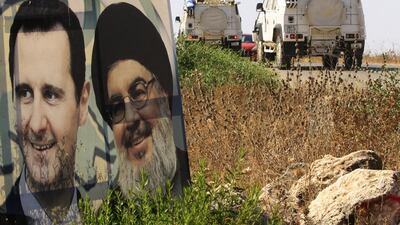Since October 17, a nationwide uprising took Lebanese by storm, forcing then prime minister Saad Hariri and his Cabinet to step down. In December, Iran-backed Hezbollah and its ally, the Christian Free Patriotic Movement, or FPM, were duped into naming Dr Hassan Diab, a Sunni academic, as prime minister designate. It is the prime minister designate's duty by law to form the Cabinet but acting foreign minister and head of the FPM, Gebran Bassil mistakenly thought he could impose his preferred nominees on a relatively unknown prime minister and divide the spoils with Hezbollah.
Much to the dismay of Mr Bassil, Mr Diab appears bent on forming a government of unaffiliated experts, in compliance with the demands of protesters. Mr Diab has challenged Mr Bassil as well as his father-in-law Lebanese President Michel Aoun, with active support from pro-Syrian politicians, most notably member of parliament Jamil Al Sayyed. Other pro-Syrian factions voiced their demands to be represented in the new government, effectively competing with the FPM for the next Cabinet's 18 ministries.
It seems that Mr Diab, far from being weak and isolated, has considerable support from Pro-Syrian factions opposed to Mr Hariri. Grand Mufti Abdul Latif Darian and other Sunni dignitaries have refrained from criticising Mr Diab, avoiding the thorny issue of his legitimacy within the community.
More importantly, the Saudi leadership has yet to take a position on Mr Diab, which may indicate that they are ready to give him a chance. Syrian President Bashar Al Assad has yet to comment on the situation but Druze politician Wiam Wahhab, one of Syria's closest allies in Lebanon, has indicated he was the one to suggest Mr Diab for the position of prime minister. The Russians first endorsed Mr Hariri but after Mr Diab was officially nominated, they have assumed a neutral stance. Western powers are closely watching as Lebanese politicians bicker while the economy is in free fall.
Ordinary Lebanese are struggling to cope with the deep recession yet Hezbollah is only concerned with consolidating its power in government while the FPM is preoccupied with the issue of presidential succession. Other players such as parliamentary speaker Nabih Berri, and Mr Jumblatt are worried about the return of Syrian influence in Lebanon. Mr Diab’s intransigence poses a threat to traditional politicians. So much so that Mr Bassil now sees common cause with Mr Berri.
Since the end of the Syrian occupation in 2005, Damascus' influence in Lebanon had dwindled considerably. During the 2018 parliamentary elections, it was mainly channelled through its support of Hezbollah. In the years leading up to the occupation, the FPM was dismissive of Syria and Mr Bassil did not bother with diplomatic niceties, often citing collaboration with congressman Eliot Engle to pass the Syria Act in Congress in 2004. Why bother when Hezbollah was calling all the shots?
But times have changed. In October last year, Mr Bassil said he was willing to meet Mr Al Assad in Damascus. Since 2006, the FPM has struck a heinous alliance with Hezbollah. And while a few years ago, the Syrian regime seems doomed to collapsed, it is now bolstered by Russia and controls most of the nation's territory. Several Arab countries are vying for better ties with Mr Al Assad, after having lost hope in the capacity of Lebanon's anti-Iranian block to curb Tehran's influence.
A month ago, it seemed unlikely that a Sunni academic with little Sunni support could stand up to Mr Aoun and his son-in-law Mr Bassil, in favour of pro-Syrian groups. Yet this is exactly what Mr Diab has done. For once the "axis of resistance" cannot blame the US or scapegoat Syrian refugees for the current impasse. Bickering among different factions within the alliance, who oppose Mr Diab, has stalled government formation.
Russia has so far stood on the sidelines in Lebanon but, if pressured, Moscow is more likely to side with Damascus rather than with a non-state actor such as Hezbollah.
The US may also face a dilemma as it disengages from the region. Hezbollah is starting to face increasing limitations to its political ascendancy in Lebanon, not only due to a months-long popular uprising and American sanctions. It also has to contend with the return of Syrian influence and rivalries between its allies. Syria may not be able to call the shots just yet, but its presence can no longer be ignored.
Dr Basem Shabb is a former member of parliament in Lebanon

